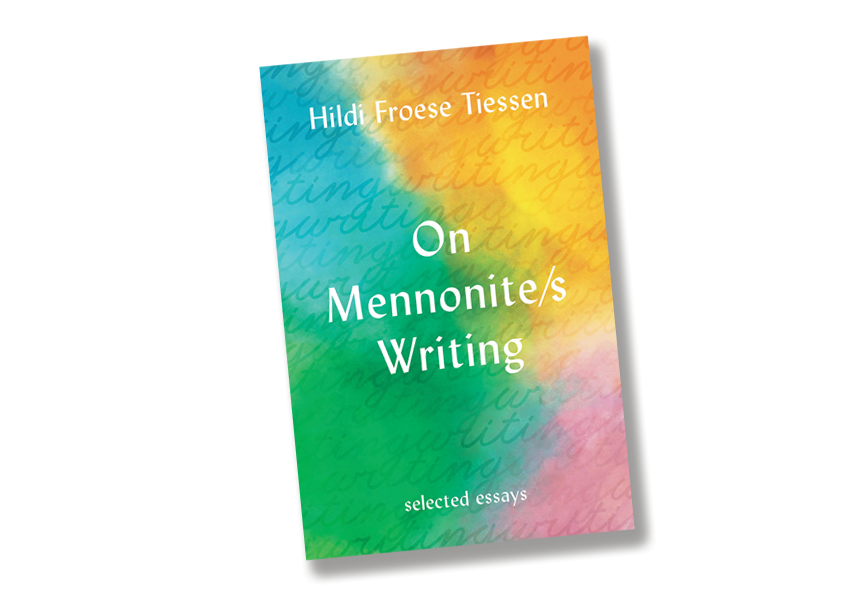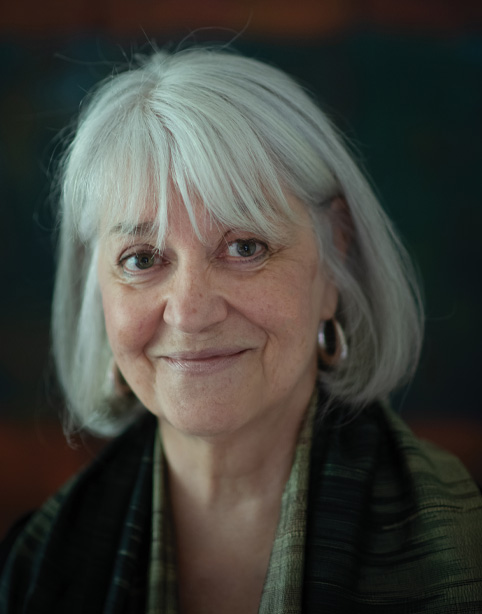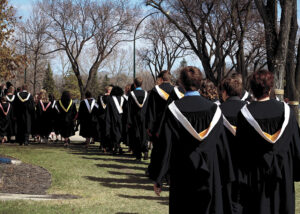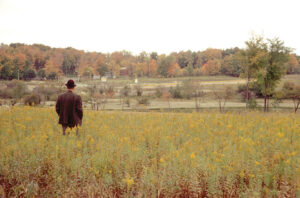A new book celebrates the work of one of the foremost scholars of Mennonite literature.
On Mennonite/s Writing: Selected Essays is the first collection of work by Hildi Froese Tiessen, professor emerita of English and peace and conflict studies at Conrad Grebel University College in Waterloo.
Edited by Robert Zacharias and published last December by CMU Press, the book includes 18 essays that reflect a half-century of critical engagement.
“A lot of Mennonite writing illumines the ambivalence and desire, the confusion and comfort a person of faith might encounter,” Froese Tiessen says. “Like all great literature, the finest writing by Mennonites is full of seekers, characters interested in spiritual things, people who strive to live well together.”
In 1973, Froese Tiessen published one of the earliest academic essays about Rudy Wiebe’s fiction. Since then, she has examined the literary careers of writers like Di Brandt, Patrick Friesen, Sandra Birdsell and David Waltner-Toews in essays, book chapters and talks.
She is credited with shaping the field of contemporary Mennonite literary studies.
Still, when Zacharias suggested the idea for a collection of her work more than a decade ago, Froese Tiessen wasn’t interested. She was wary of the amount of work that goes into editing a collection and wanted to direct her energies to fresh writing instead.
Zacharias approached her with the idea again in 2022, with the offer that he would edit the collection and CMU Press would publish it. This time, Froese Tiessen was receptive.
“So why did I say yes? This question offers me an opportunity to thank Rob Zacharias and (CMU Press publisher) Sue Sorensen, who worked so very hard on my book—who were generous and forbearing, skillful and insightful on every front,” Froese Thiessen says. “They made this book. I was privileged to be able, nevertheless, to have ‘the last word.’ What a gift.”
That last word is “Some Hidden Rhythm,” an essay she wrote specifically for the collection. In it, she reflects on her experience as a scholar of Mennonite literature and the changing nature of the field.
Revisiting 50 years of her work left Froese Tiessen with the strong sense that there was a coherence to her critical approach and that she had come to the end of some kind of cycle in her own writing and thinking.
“Whatever that project was, [it] was coming to completion or had been completed,” she says.
For Zacharias, a professor at Toronto’s York University, it was obvious that a collection of Froese Tiessen’s work needed to be published.
Between her scholarly work and her involvement organizing Mennonite/s Writing, a series of international conferences that started in 1990, Froese Tiessen hasn’t commented on the field of Mennonite literary studies so much as she’s enabled it, Zacharias says.
“She started fostering a critical conversation about Mennonites, bringing together authors and other scholars, and created a space where the rest of us could join a conversation,” Zacharias says. “There’s no question she’s been the animating figure for the critical conversations across North America.”
On Mennonite/s Writing was published with a few audiences in mind, including general readers. Zacharias notes that two of the essays originated as public talks intended for general audiences.
“It occurs to me there are people well beyond the literary community who would find a work like this genuinely worth dipping into,” Froese Tiessen says. “A lot of the work I did has a lot to do with the relationship between a community and a writer more than delving into a text… It’s much broader than a conventional literary analysis.”
A Kitchener-Waterloo area launch for the book will be held in the chapel at Conrad Grebel on Thursday, April 4, at 7:30 p.m. Froese Tiessen hopes to hold a launch in Winnipeg, where she was raised, later this year.
For Froese Tiessen, who attends Rockway Mennonite Church in Kitchener, her work as a teacher, administrator, scholar and event organizer has all been part of her spiritual being.
“I think my writing reveals that my faith was alternately challenged, enhanced and sustained by the many stories and poems I was privileged to read and teach,” she says.
She points to something that American writer Jeff Gundy once said: “I believe that we will benefit from listening to our poets. I doubt that they will save us, but I believe they can make us a little less lost.”

Hildi’s recommendations (Q&A)
Who is your favourite Mennonite writer? Or, whose work do you find yourself revisiting most often?
I am not being disingenuous when I say that I don’t think in terms of favourites. I do often revisit the work of Mennonite writers. The texts I might be drawn to depend on my circumstance and mood. Often, I am drawn to work that offers the kind of evocative intimacy I might find in Rudy Wiebe’s beautiful memoir of childhood, Of This Earth, or the compelling sensuousness of Patrick Friesen’s The Shunning.
Other times I might seek out the acerbic wit of Miriam Toews or Dallas Wiebe.
What is your favourite book by a Mennonite writer?
Depending on my mood, I might enjoy some of the domestically inspired poetry of Jeff Gundy, Sarah Klassen or Julia Kasdorf. Or I might return to the fiction of Rudy Wiebe, from the thoroughly accessible (and profoundly prophetic) Peace Shall Destroy Many to the more challenging and more complexly rewarding The Blue Mountains of China or Sweeter Than All the World.
What is your favourite poem by a Mennonite writer?
I find myself revisiting work as delicious as Patrick Friesen’s “An Audience with the Dalai Lama” or as moving as some of the gently evocative unnamed pieces near the front of Di Brandt’s questions i asked my mother.
What is the most recent book you’ve read by a Mennonite writer?
David Bergen’s Away From the Dead, a fabulous novel by an extraordinary writer who somehow never wastes a word. Before that, I read Sarah Klassen’s The Russian Daughter, which I also greatly enjoyed. And poetry. Sarah Ens’ Flyway is one of many terrific newer poetry collections published recently by younger—and older—poets.
Is there a Mennonite writer that has emerged in the last 10-15 years whose work you’ve enjoyed?
The luminous beauty of the early chapters of Sofia Samatar’s The White Mosque grabbed my attention, as did the startling provocations embedded in Rachel Yoder’s Nightbitch or Elina Penner’s (German language) Nachtbeeren.
If someone is new to Mennonite literature, where do you suggest they start?
What comes immediately to mind is this: If you like to read prose, why not start with Liars and Rascals, a collection I edited that includes really wonderful short fiction by Rudy Wiebe, David Waltner-Toews, Sandra Birdsell, Sarah Klassen, Armin Wiebe, Andreas Schroeder and others.
If you like poetry, seek out Ann Hostetler’s compilation of 24 Mennonite poets entitled A Capella. Decide which of these writers you like and move on from there. For an accessible critical essay on Mennonite writing, you might visit chapter 11 of my new book.
Goshen College’s online Center for Mennonite Writing (mennonitewriting.org) is a great source for those interested in what is happening in the field now.









Leave a Reply
You must be logged in to post a comment.